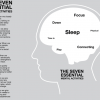It depends what you class as brain damage. Long term use of any powerful medication will probably cause brain structure changes, its unlikely the mania will last forever if you use high doses constantly. You may want to attenuate tolerance by adding DXM or Memantine.
Its unlikely Amphetamine causes neurotoxicity like causing structural degredation like those seen in abnormal inflammation and glycation leading to parkinsons or dementia of which takes a long time for side effects to develop, but structural and neurotransmitter changes are likely to alter brain function in the long term in the fact that the structures may be irreversibly change to adapt to the constant artifical interference, though in what way is hard to say and it really depends on the individual. What I mean is long term moderate amphetamine use is unlikely to be as harmful as eating mcdonalds everyday, but it may have other non-fatal but troubling side effects, dependence, lethargy, slow mind.
also due to the incredibly subjective nature of cognitive function and moods - long term studies are time consuming (duh) and there isn't really enough research in it nor an understanding of how manipulating neurotransmitters concentrations really work in the long term. The fact that in our youth we also have immense reserves of cognitive reserves, so that the damage caused is not easily seen until much later in life. In other words long term effects of psychotropic drugs of any kind are basically very poorly understood, brain scans only offer a small glimpse into whats actually going on at a molecular level, post mortem research on humans? not really enough data there,
Judging by the millions of Americans taking adderall, I doubt in reasonable doses it causes huge neurotoxicity. However its fair to assume constantly using a chemical to trigger dopamine release will probably lead to the body being unable to generate dopamine on its own, from what I read it seems people who take this kind of medicine just accepts the dependency that develops eventually.
Furthermore the natural attentuation of stimulants is probably a healthy thing in the long run (though not useful for those of us who want to treat a problem), since there isn't anything good about have constant sympathetic reactions in the body for long periods of time. All stimulatory responses in the body causes side effects in the long run, blood pressure rises, cellular metabolism is heightened, sleep worsens, natural cell death is impaired which leads to a delayed response in various internal antioxidative mechanisms that do a lot more than a few vitamin supplements.
It is arguable that perhaps people with ADHD will not develop the same side effects over time, but amphetamines has peripheral effects all around. Its why dopamine agonists are so dangerous because it doesn't even adhere to the ratios of dopamine within our vesicles (it mimicks dopamine, without using dopamine), people with ADHD lack cerebral focus in certain areas of the brain, but not the entire body, an ADHD drug simply HAPPENS to also trigger dopamine release in someareas in which signal transmission is lacking.
So in the long run a NT (neurotypical) should be able to take more abuse than an true ADHD in my opinion, due to the lack that when rebound happens, the ADHD person will be left with even LESS signal transmission than before due to the drop in dopamine sensitivity from tolerance, as both types NT or ADHD will face tolerance. Of course it is subject to the individual really. I know some people who have done cocaine for 20 years or whatever and they function fine as long as they are on cocaine, you do sense long term cognitive changes though in these people for worse.
Two things may happen in the long term 1) receptors increase leading to more dopamine requiring to trigger neuronal signalling, 2) receptors eventually STOP functioning due the barrage of excessive dopamine released. Dopamine is particularly tricky because it is tied with our reward/motivation/pleasure.
Whilst there may not be neurotoxicity under reasonable doses, I think we can guess that chronic use without attentuation such as NDMA antagonists or Dopamine upregulation or time. We can probably guess that eventually lethargy and a zombie state will develop in absense of the dopamine releaser (in this case amphetamine). The same thing happens with all dopamine releasers such as coffee, only amphetamine is a exceptionaly efficient and powerful one. Again in the example of coffee, neurotoxicity does not happen but long term body regulation parameters such as hormonal axis do change when coffee is used in high doses chronically.
Personally the above is the reason why I have been unable to develop a consistent stack, you eventually run into a brick wall in which no amount of dopamine release will make you normal again, there is a point those receptors just switch off and the only thing that will solve it is time, which can vary anywhere from months to decades. So I use supplements and nootropics, and I'll use medicine when I need to, but sadly medicine are the most efficient at making a true 180 degree turn.
Finally - its risk vs reward isn't it? You may be healthy if you avoided drugs alltogether, but you may lose years of productivity and life quality if you really needed these medications to function. I don't think there is a perfect answer here.
Edited by Major Legend, 15 August 2014 - 10:08 AM.

















































